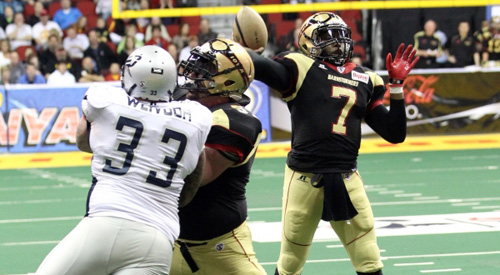
Former Hawkeye Brad Banks finds home with Iowa Barnstormers
They say you can always go home again. For Brad Banks, the state of Iowa is not home — he’s a Florida native — but it was where his biggest on-field success has come. Banks had a standout senior season at the University of Iowa and now is back in the state with the Iowa Barnstormers of the Arena Football League.
“It’s a true blessing, the support that the people give for their athletics whether at the university level or at the professional level,” Banks said. “They show up to away games and show a lot of love. To be back in Iowa, that’s the icing on the cake.”
In 2002, Banks was the runner-up for the Heisman Trophy as NCAA football’s top player after leading the Hawkeyes to a share of the Big Ten conference championship and an 11-2 record. He also took home the Davey O’Brien trophy for top quarterback in the NCAA.
Things didn’t go as smoothly for Banks after college, though. He wasn’t selected in the 2003 NFL Draft, but signed as an undrafted free agent with the Washington Redskins. After his release shortly thereafter, Banks went to the Canadian Football League to sign a deal with the Ottawa Renegades. He wound up playing north of the border for five years in Ottawa, Winnipeg and Montreal, but mostly served as a backup for the Montreal Alouettes.
Playing as a member of the Alouettes wasn’t always easy for Banks, as he sat in the shadows of CFL legend Anthony Calvillo on the depth chart, but Banks believes the northern experience was valuable, despite the reserve role.
“I learned a lot up there,” Banks said. “I matured a lot as a player and it helped me to be throwing the ball 90 percent of the time in practices. I got some stuff from there and it definitely wasn’t a waste.”
[php snippet=1]
Although Banks had limited playing time in his five years in Canada, his last year, 2009, was his best since 2004. He completed 75 percent of his passes (30/40) with three touchdowns to compare with only one interception. He had some starting chances in 2004 and used those to throw for 849 yards with seven touchdowns and two interceptions. Even after he was released, he said he didn’t think that reflected on his ability as much as the Alouettes’ quarterback plans.
“I knew I could play football,” Banks said. “It becomes more business decisions when you get to the professional level.”
Banks sat out last year after he had a failed tryout with the AFL’s Orlando Predators. He was released because the team wanted to go in a different direction with quarterback Nick Hill.
“They came to me, wanted to see me throw,” he said. “The coach had a plan, knew what he wanted to do and that’s fine. God had a plan and there are no hard feelings.”
That didn’t convince Banks to give up on a football career, though.
“The itch to play never really goes away,” he said. “As soon as you get back on the field everything comes back to you. It can be tough but once I got out there everything started rolling.”
This summer he came back and won the starting job with the Iowa Barnstormers, enjoying success even when the team did not. Banks set a team record with 11 touchdowns in one game (10 passing and one rushing) but the team started 3-10 before he was benched midseason for a game against the Chicago Rush 58-48 on June 26.
Banks returned as the starter with a 55-53 win over the Tulsa Talons July 1 and threw for 264 yards with six passing touchdowns and one rushing.
Banks had a significant adjustment to make going from the Canadian field, which is the largest gridiron at 110 yards long and 65 yards wide (10 yards longer and 12.5 yards wider than a field using American rules) to the AFL’s field, which is the smallest (50 yards and the width of a hockey rink). He said it wasn’t as hard as it might seem, though.
“When you go from the bigger field to the small field, it makes you feel like you could throw any ball,” Banks said. “That alone gave me the confidence that I could play in the league. In the CFL, three guys could move before the snap. In the AFL, it’s only one guy and it makes it a lot simpler. The hardest thing is to get the ball out a lot quicker.”
Like Banks, the AFL has bounced back from some rough situations. In 2009, the league and the players association agreed to suspend activity to restructure the league’s finances, and many thought that might signal the league’s permanent demise. However, the league returned in 2010 and now has a deal to televise games on the NFL Network.
While Banks still feels he has a lot to give on the football field as a player, he feels he could also help out as a coach once he’s finished as a player. There were rumors of him joining the Hawkeye coaching staff before his signing with the Barnstormers. He said he wants to keep playing for now, but coaching may be in his future.
“Ten years ago, I would have said no because there is so much work that goes into it,” he said. “But, coaching kids at camps and private sessions sparked my interest in it and shows I have a lot of information that I could send down. Seeing the changes you could help them make so they can improve makes me think that coaching is something I will probably do when I’m done playing.”
[php snippet=1]

